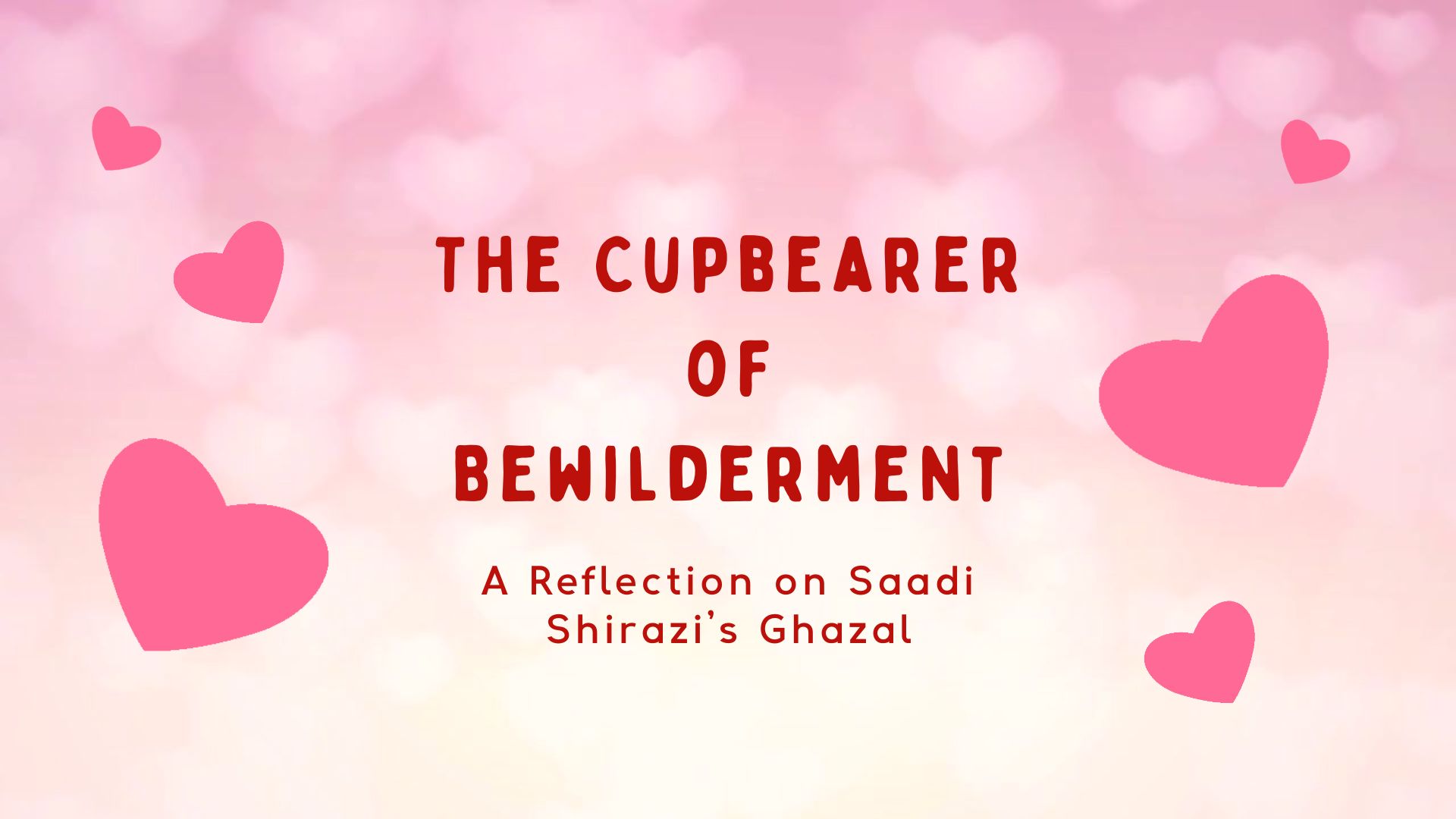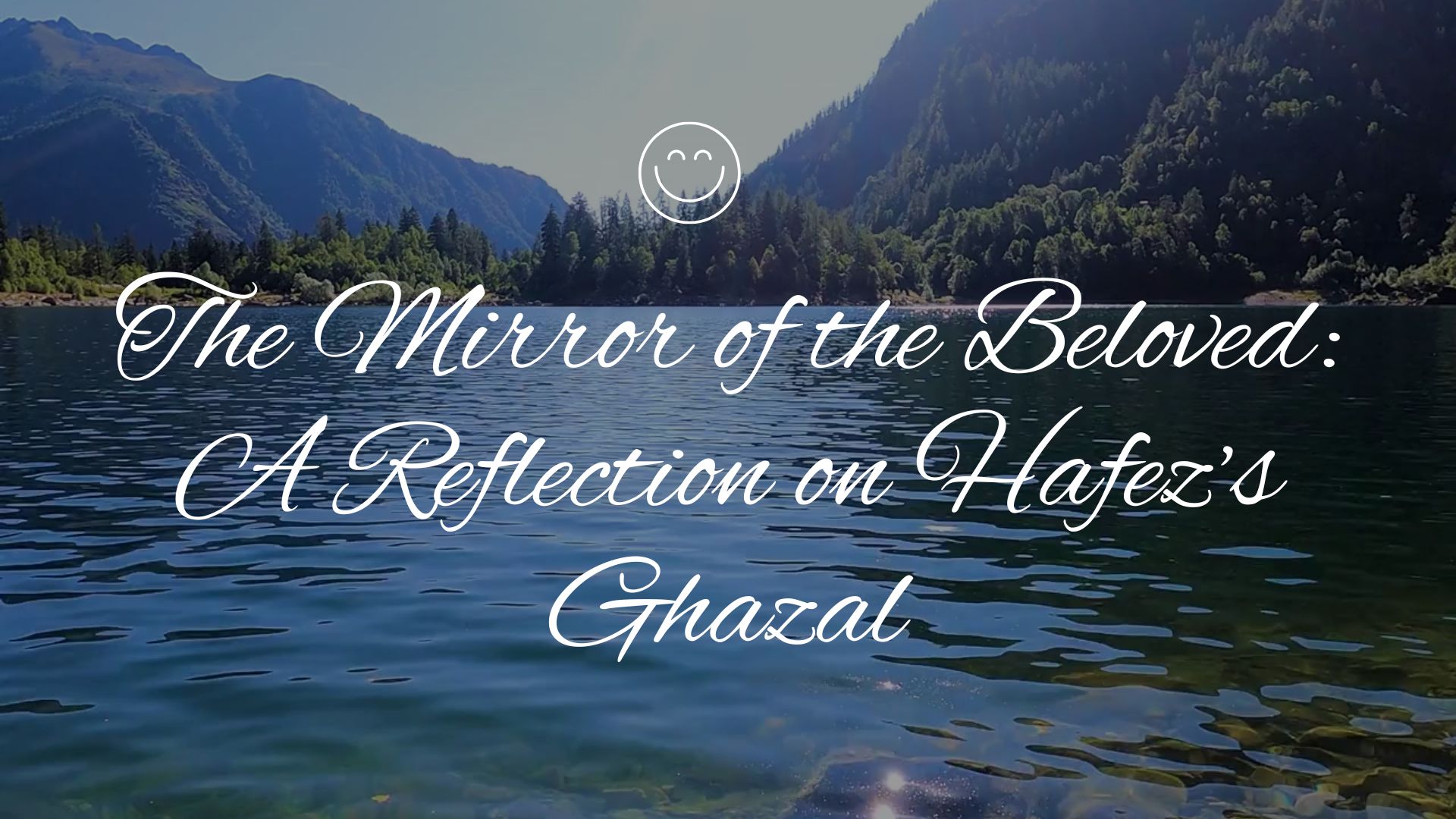Beautiful ghazal of Rumi (Jalal ad-Din Balkhi) is among his most mystical and layered. It moves between cosmic vision and intimate yearning, between the night of separation and the dawn of awakening.
بیا کامشب به جان بخشی به زلف یار میماند
جمال ماه نورافشان بدان رخسار میماند
به گرد چرخ استاره چو مشتاقان آواره
که از سوز دل ایشان خرد از کار میماند
سقای روح یک باده ز جام غیب درداده
ببین تا کیست افتاده و کی بیدار میماند
به شب نالان و بیداران نیابی جز که بیماران
و من گر هم نمینالم دلم بیمار میماند
در این دریای بیمونس دلا مینال چون یونس
نهنگ شب در این دریا به مردم خوار میماند
بدان سان میخورد ما را ز خاص و عام اندر شب
نه دکان و نه سودا و نه این بازار میماند
چه شد ناصر عبادالله چه شد حافظ بلادالله
ببین جز مبدع جانها اگر دیار میماند
فلک بازار کیوانست در او استاره گردان است
شب ما روز ایشانست که بیاغیار میماند
جز این چرخ و زمین در جان عجب چرخیست و بازاری
ولیک از غیرت آن بازار در اسرار میماند
English translation of this mystical ghazal by Rumi (Molana Jalaluddin Balkhi):
Come tonight, and breathe life into me again ,
For your dark hair is like the Beloved’s night,
And your radiant face outshines the moon’s beauty.
Around the heavens, the stars wander like lost lovers ,
From the burning of their hearts,
Even reason forgets its work.
The Cupbearer of the soul has poured a draught
From the invisible wine of mystery ,
Now watch who will fall in ecstasy,
And who will remain awake.
In the night you’ll find none wakeful but the ailing ,
And even if I do not cry aloud,
My heart remains sick with love.
O heart, in this sea without companion,
Cry out like Jonah in the whale!
For in this ocean of night,
The sea-beast devours men without care.
Such is the night’s consuming power ,
It devours both high and low alike;
And when it has done its work,
No shop remains, no trade, no marketplace.
Where is the helper of God’s servants?
Where is the guardian of God’s lands?
Look , all are gone.
None remains but the Creator of souls Himself.
The sky is the marketplace of Saturn,
Where the stars move in their orbits ,
Their night is our day,
For they remain free of all others.
Beyond this heaven and this earth
There lies within the soul a wondrous sky, a hidden market ,
But out of jealousy for its beauty,
That market remains concealed in mystery.
There are nights when the soul no longer belongs to this world.
Nights when the stars seem to speak, when every breath feels ancient, and the heart trembles with a longing it cannot name.
In such hours, Rumi’s voice rises from the centuries like a companion in the dark: a guide, a lover, a mirror.
He begins with an invitation , not to understanding, but to presence:
“Come tonight, bring life again , for your hair is like the night of the beloved;
The beauty of the moon that pours out light resembles your radiant face.”
Already, the world begins to blur.
We are no longer in the physical night, but in the night of the soul , that deep, luminous stillness where longing becomes prayer.
The beloved’s hair, dark and endless, is the veil of mystery.
Her face, moonlit and radiant, is the glimpse of truth shining through the veil.
Rumi calls not for philosophy, but for encounter.
He wants the living presence , the coming of the beloved , because in her nearness, existence itself remembers how to breathe.
The Stars of Longing
“Around the heavens circle the wandering stars ,
like the exiled lovers of this world.
And from the burning of their hearts,
even reason forgets its work.”
Look up, Rumi says. Even the stars are restless.
The entire sky is a map of longing.
Each orbit, each turning, each shining is an act of yearning for the One.
The stars, though high and serene, are not at peace , they are lovers in motion, forever circling the center they cannot reach.
And in their ceaseless turning, even reason , the quiet accountant of the universe , loses its rhythm.
For love does not move in straight lines; it spins, it burns, it forgets itself.
Rumi sees in the sky what the mystic feels within: a vast motion of desire toward the Beloved.
The cosmos is not cold; it is alive with passion.
Every planet, every atom, is a lover in exile.
The Wine of the Unseen
“The cupbearer of the spirit has poured a wine from the cup of the unseen ,
look who is fallen, and who remains awake.”
Here is Rumi’s divine paradox.
There is a cup, but not of this world.
There is wine, but not of the vineyard.
It is poured by the unseen hand , the Cupbearer of the soul, the Spirit that awakens by intoxication.
Those who taste it fall , not into sleep, but into awareness.
They stumble not into confusion, but into truth.
For to fall in this way is to rise beyond the limits of self.
“Look,” Rumi says, “see who remains awake.”
Who among us can drink of this wine , the wine of annihilation , and still stand?
Who can stay conscious in the flood of love?
Most fall into ecstasy; few remain as witnesses.
Those who do , the awakened , become the stars by which others find their way.
The Night of the Lovers
“In the night, none cry out or stay awake but the sick ,
and even if I make no sound, my heart is ill.”
The night belongs to the lovers, the restless, the wounded.
While the world sleeps in forgetfulness, they wake in remembrance.
Their sleeplessness is not suffering , it is devotion.
Even silence is a kind of prayer when the heart burns.
To be ill with love is to be alive.
It is better to ache for the Beloved than to live untouched by longing.
For in love’s sickness lies the cure of the soul , the transformation that makes us real.
Rumi admits it gently: even if his lips do not cry out, his heart does.
Every beat is a whisper of absence, every breath a call to return.
The illness of love is not meant to end , it deepens until it becomes union.
Jonah in the Sea of Night
“In this sea without a companion, O heart, cry like Jonah;
For in this ocean, the whale of night devours all men.”
What a stunning image.
The sea is the night , vast, soundless, indifferent.
And the soul, like Jonah, has been swallowed by it.
But even in the belly of darkness, Rumi says: cry out.
Do not surrender to silence.
Jonah’s salvation came not from escape, but from remembrance within the depths.
The “whale of night” is despair, forgetfulness, ego, time , everything that devours our light.
But even there, prayer is possible.
Even there, a voice rises that no darkness can drown.
The cry of the heart is the echo of God remembering Himself.
The Market of Night
“By night, it consumes both the low and the high ,
until no shop, no trade, no marketplace remains.”
Rumi turns from the cosmic to the human:
Night, he says, devours the world.
All our trades, our ambitions, our pursuits , dissolve in its shadow.
In the dark, no merchant can buy, no ruler can command, no scholar can boast.
Everything we call “mine” is temporary.
Night levels all distinctions, leaving only truth: that we are travelers, each passing through.
What remains when the marketplace of the world falls silent?
Only the heart , and what it has loved.
This is the wisdom of the mystic:
The true market is not outside but within.
The true bargain is not for goods, but for the soul.
The currency is longing; the profit is awakening.
The Vanishing of Names
“Where is Nasir, the servant of God?
Where is Hafiz, the guardian of His lands?
Look , none remain but the Creator of souls.”
Rumi names the absent , the righteous, the leaders, the saints , and finds that even they have passed.
All names fade, all roles dissolve.
Even holiness is swallowed by time.
Only the Origin remains , the Creator of souls, the One who is neither born nor lost.
Rumi’s gaze has become cosmic again: he looks across the centuries and sees that nothing endures but Love itself.
Our deeds, our prayers, our fame , all are waves that vanish into the same sea.
Only the ocean abides.
To realize this is not despair; it is freedom.
The Celestial Market
“The heavens are the marketplace of Saturn,
where the stars turn in their trade.
Their night is our day,
for they remain without others.”
How marvelous, this vision!
Rumi imagines the sky as a vast bazaar of souls.
Each star is a merchant of light, trading in silence, circling its secret.
Their commerce is not of gold or goods, but of remembrance and radiance.
“Their night is our day” , meaning: what we call darkness, they call revelation.
For the saints and lovers who dwell beyond ego, even the deepest night glows with the light of unity.
To be “without others” is to be beyond separation, beyond duality.
It is to dwell in Oneness, where love has no opposite.
The Hidden Wheel
“Beyond this sky and earth, within the soul,
there is another wheel, another market ,
but from jealousy of that hidden world,
this one remains veiled in secrecy.”
Here Rumi reveals the heart of his vision.
The visible universe is not the final realm , it is a reflection of something more real, more luminous, within.
Inside every soul, there is another cosmos , a secret market of spirits, where the currency is love and the trade is self-surrender.
But that world is hidden, not because it is far away,
but because we have not yet turned inward to see it.
It hides itself out of divine jealousy , to protect its beauty from unready eyes.
The outer world dazzles us with form and distraction,
yet the inner world waits , silent, infinite, real.
The mystic’s task is not to flee the outer,
but to pierce it until the inner is revealed.
That is Rumi’s “other market”:
a world not of buying and selling,
but of losing and finding ,
of trading illusion for truth, and self for Love.
The Circle of Return
Every image in this ghazal , the moon, the stars, the wine, the night, the market , turns upon one axis: the soul’s journey from separation to reunion.
It begins with longing for the beloved’s face,
passes through the sickness of the heart,
descends into the sea of night,
and rises again into the hidden heaven within.
This is the path of every lover and every seeker:
to be lost, to be found, to be lost again ,
until the losing itself becomes union.
Rumi’s vision is vast, yet intimate.
He does not speak of some distant heaven;
he speaks of the cosmos inside the heart.
The same forces that move the stars move our longing.
The same silence that fills the heavens fills our breath.
He calls us not to escape the world, but to awaken within it ,
to see that the night that frightens us
is also the womb of revelation.
The Night as Grace
In the end, night is not darkness , it is mercy.
It strips away the noise of the day,
it silences the marketplace of the mind,
it reminds us that we were never in control.
Rumi’s beloved , that moon-faced mystery , is both the cause of our restlessness and its cure.
She steals our reason to return us to wonder.
She wounds us so we may cry out.
She hides so that we may learn to seek.
And in that seeking, something beautiful unfolds:
the ordinary world becomes transparent,
and the hidden market of the soul begins to glow.
Epilogue: The Secret Market
There is a secret market, Rumi says ,
one that has no currency, no noise, no buyer or seller.
There, only lovers trade ,
offering their hearts for nothing,
and receiving everything in return.
In that place, even the stars are poor.
Only those who have lost themselves are rich.
And when you ask the price of love,
the Cupbearer smiles and says:
“Yourself.”





